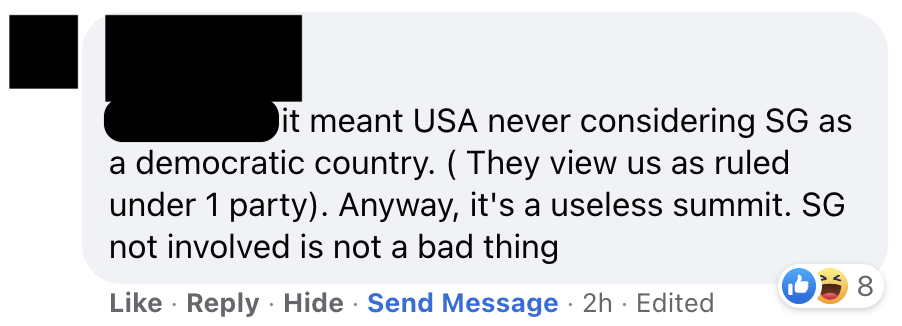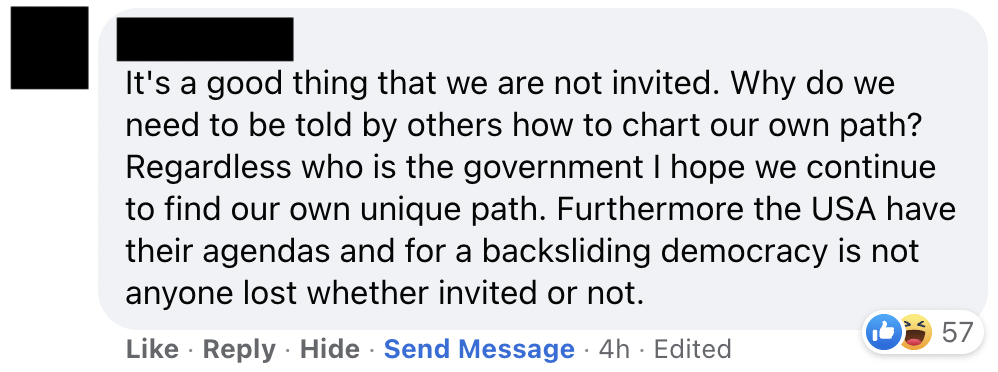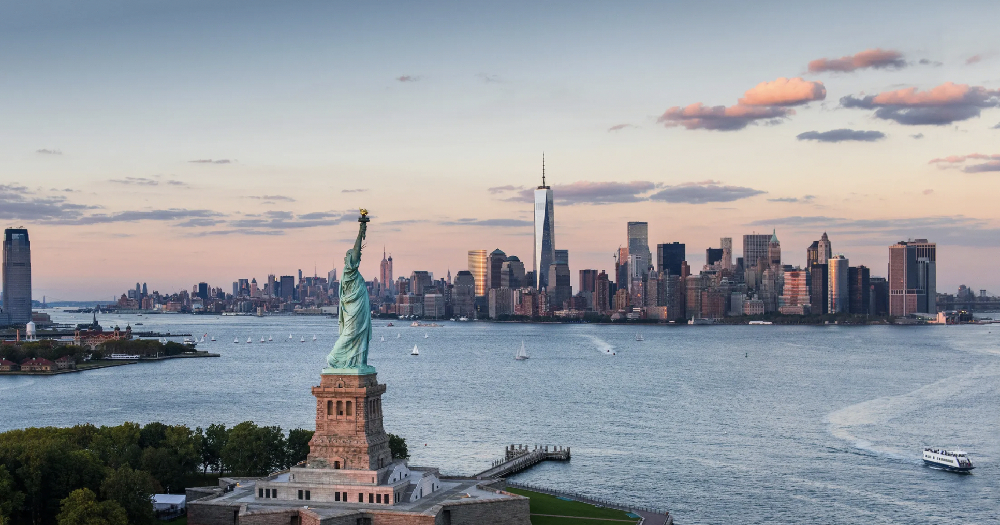Follow us on Telegram for the latest updates: https://t.me/mothershipsg
The U.S. has invited 110 countries and regions to a virtual "Summit for Democracy".
Hosted by U.S. President Joe Biden, it's set to be held on Dec. 9 and 10.
Of the invitees, Taiwan's inclusion has invited backlash from China, which has accused Biden of making a "mistake", as reported by The Guardian.
While Taiwan is a self-ruled island that China claims as part of its territory, the U.S. has called Taiwan an "important strategic partner" that shares the same democratic values, even though it has no formal diplomatic relations with Taiwan.
Singapore not invited
Along with China, Singapore was not on the list of invitees. Perhaps making its exclusion more stark is the inclusion of its Southeast Asian neighbours, like Malaysia, Indonesia and the Philippines.
Mothership understands from the Ministry of Foreign Affairs that Singapore was not invited to the summit.
Singapore's exclusion has sparked a bit of discussion among some social media users, who wondered about the reasons behind the decision.
Many also thought it was perhaps a good thing that Singapore wasn't invited, citing the country's own system of governance that doesn't necessarily adhere to the western liberal democratic model, as well as the need to maintain a balancing act between the U.S. and China.
 Screenshot via Mothership/Facebook
Screenshot via Mothership/Facebook
 Screenshot via Mothership/Facebook
Screenshot via Mothership/Facebook
 Screenshot via Mothership/Facebook
Screenshot via Mothership/Facebook
 Screenshot via Mothership/Facebook
Screenshot via Mothership/Facebook
 Screenshot via Mothership/Facebook
Screenshot via Mothership/Facebook
Singapore remains a key strategic partner to the U.S. despite not being invited
Despite the concerns that some might have, Adrian Ang, a U.S. policy expert at Singapore-based S. Rajaratnam School of International Studies (RSIS), tells Mothership that there is no need to read too much into Singapore's exclusion from the summit.
Regardless of the list of invitees, Singapore remains a key "strategic partner" of the U.S., and this has been "evident" in the visits made by U.S. Defense Secretary Lloyd Austin and Vice President Kamala Harris earlier this year, he said.
He further noted that outside of the Philippines -- a U.S. treaty ally -- neither of the U.S.' key strategic partners in Southeast Asia -- Singapore and Vietnam -- were invited to the democracy summit.
U.S. allies such as Egypt and NATO partner Turkey were not on the list too.
But this "does not diminish their strategic and political salience to the U.S.," Ang said, adding that it is "probably more telling about the salience of the democracy summit".
Summit's purpose and impact questioned
Apart from Biden redeeming one of his campaign pledges in finally hosting this summit, Ang said that he "struggles to see what can, or will be, substantively achieved by this summit".
Already, rights advocates have questioned to what extent can the virtual event persuade world leaders to take meaningful action to stop the erosion of rights and freedoms, Reuters reported, although U.S. officials said the event was simply the "launch" of a longer conversation about democracy.
Some leaders invited were from countries that have been experiencing an erosion in democracy, such as India and the Philippines, according to a report by the International Institute for Democracy and Electoral Assistance (IDEA), a European think tank based in Stockholm.
Strategic interests could be a factor too, with India and the Philippines -- countries that are close to China geographically -- being invited. This is in spite of them experiencing troubles with their democracies, as IDEA claimed in its report.
Indeed, Ang noted that the summit was the product of "a complex and bureaucratic inter-agency process" that takes into consideration broader U.S. strategic interests.
U.S.' own democratic record called into question
Additionally, Ang said that the U.S. faces its own "democratic woes" that should be "apparent to all", which cast doubts on the actual impact of the summit.
Citing the annual list of "backsliding democracies" by IDEA, Ang noted that for the first time, the U.S. has appeared on that list.
But while IDEA notes that a "visible deterioration" began in 2019, Ang argued that this has gone on "for much longer".
He cited the drop in the U.S.' score on Washington D.C.-based non-profit organisation Freedom House's annual report on political rights and civil liberties, from 90 out of 100 in 2016, to 83 in 2021.
The changes have shifted the country out of the company of "advanced industrial democracies" like France, Germany and the UK, into the company of states with weaker democratic institutions, such as Mongolia, Romania and Ghana, he said.
"This has practical policy and political consequences," he added.
U.S. has itself to blame for its own democratic decline
Ang further cited a report by Politico regarding the 2021 Halifax International Security Forum, where U.S. allies talked about their "worries and fears about the U.S.' domestic political dysfunction", such as "hyper partisanship, polarisation, rise of extremism", which are putting the country's national security objectives at risk.
Saying that he agrees with what Democratic Senator Tim Kaine said about the U.S. "not really [being] in a position to lecture" other countries on "political unrest and corruption", Ang opined that this democratic summit has come at "a very low point" for the idea of the "American Exceptionalism".
He continued:
"The U.S. invasion of Iraq has (or should) probably permanently ended the idea of democracy promotion by force of arms -- so-called 'regime change'.
But the other model of American Exceptionalism -- the Exemplar model where the U.S. is a 'shining city on a hill' for all the world to see -- is now equally problematic given the U.S.' own tarnished and diminished democracy."
Ang further said that while the Biden administration has placed U.S.-China competition within "an ideological framework" where they fight for the superiority of democracies over autocracies, the U.S.' own democratic record is in question, and it has itself to blame for its democratic decline.
"However, while autocratic regimes have certainly been guilty of exploiting democratic backsliding, the root causes of backsliding lie principally within democracies themselves," he said.
Follow and listen to our podcast here
Top image via Getty Images
If you like what you read, follow us on Facebook, Instagram, Twitter and Telegram to get the latest updates.
